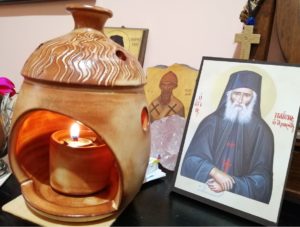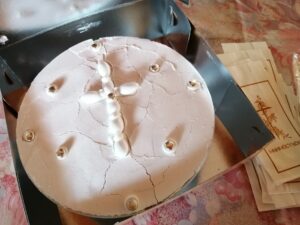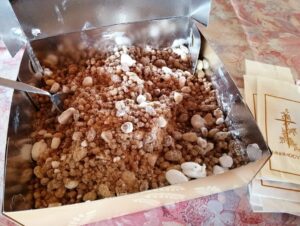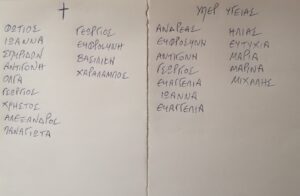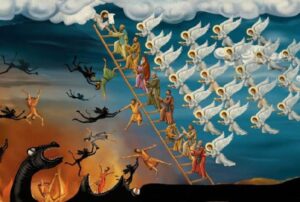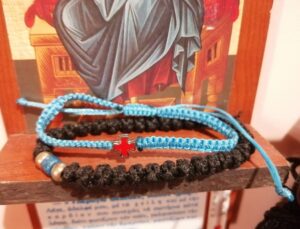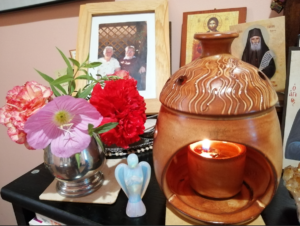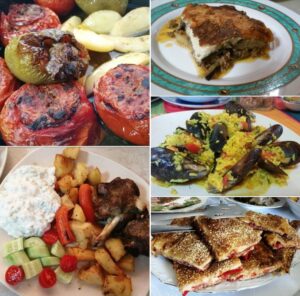The first ‘Psychosavato’ of the year was kept recently in churches all over Greece.
Psychosavato means ‘Soul Saturday’ and there are three in the Greek calendar each year. This is when the Greeks commemorate their dead.
I am sharing something extraordinary today – and I hope it will not chill your blood much 🙂
The Greeks are very serious about the spiritual world, especially when it comes to the deceased. As a result, they have a series of traditions that they dutifully honour. This is so they may ensure the rest of the souls of the departed in their family.
I guess some people don’t like to think about death, let alone to talk about it, but, being Greek, I am not one of them 🙂
Below, you will find information of various practices and customs that honor and aid the departed.
THE OFFERING OF KOLIVA
One of the most common practices is the offering of “koliva” (wheat berry memorial food) at the local church, to ensure the soul remains in peace and suitably “fed”.
The koliva is blessed at the church, where the priest mentions the deceased’s first name.
Many housewives make koliva at home, but I find that the ones that are bought are often tastier. I’ve offered koliva at the church many times, both for my mother and father’s souls, and I’ve always bought them. When you buy them, they come inside a deep bowl or a square tray.
In case you’re wondering, one does not simply walk into a supermarket or a bakery to buy koliva. This is something that only specific outlets prepare and are purchased by funeral parlors on behalf of the family of the deceased. The funeral services company will then deliver the koliva at the church in time for the mass, for the blessing to be made.
After the mass, you break up the sugary crust on the top and mix it all up to hand out the koliva in individual paper bags with plastic spoons. In memorial services this is also accompanied by a little sweet bun (tsourekaki).
“Koliva” (pronounced, ko-lee-va) is handed out to people at the church in the memory of a family member that has passed away. Traditionally, families offer koliva around the 9th day of the passing, then again around the 40th day, then once a year around the anniversary of the passing. The 3rd year anniversary is particularly important.
But there are other days in the year when families can offer koliva. One of these days is “Psychosavato” (Soul Saturday) which is not always the same date, seeing that it depends on the dates of Carnival and Easter.
There are 3 “Psychosavata” (Soul Saturdays) in any given year. The first one is in February, the second one is around Easter, and the third one is in June. Between the second and third Psychosavato, the Greeks believe that the souls stay on Earth, free to roam and to visit their loved ones. On the Psychosavato of June, when the koliva are referred to as “golden”, the souls are eager more than ever to hear their names at the church before “the gate closes” – i.e. when they leave the Earth plane to return to Heaven.
Now, about the koliva, one word of warning: If you’re offered some, take it only if you feel like eating it there and then. It doesn’t keep well, unless you put it in the fridge and eat it within 1 day tops. The wheat goes hard quickly out of the fridge, and then, it’s unedible. And please, whatever you do, do not throw it in the trash. Because it is blessed in the church for the dead, this is not recommended.
So, if you are stuck with more than you can eat, take it to your garden or anywhere in nature and throw it on the ground for the birds to have 🙂
When someone offers you koliva, you say “Theos horeston” if the deceased was a man, or “Theos horestin” if it was a woman. This basically means “May God forgive him” (or her). It is nice to spare a thought for the deceased when you eat the koliva, wishing for them to be forgiven for their sins and to be granted peace.
The basic ingredient of koliva is wheat berry (i.e. boiled wheat), which symbolizes the human body. It also contains almonds, walnuts, cinnamon, pomegranate, icing sugar, sugared almonds, raisins, and parsley. Oftentimes, the mix will have extra things like grated coconut or pine kernels.
No matter the mix, it always tastes sweet. For me, it is always a treat to be handed out some koliva, be it at church or at home by a neighbor. When I was a little girl in the 70s, I used to walk to school and back with my sister and we’d walk past a church. Oftentimes, we’d see old ladies dressed in black, standing outside the church and beckoning frantically to us to come over. We always ran eagerly to them as they’d offer us koliva on a napkin. A wonderful treat for us, every time!
If you are looking for a recipe to make koliva yourself, here is one by popular Greek chef, Akis Petretzikis.
THE TWO PAPERS
When you offer koliva at the church, you also hand two pieces of paper to the priest. One is for blessing all the deceased in the family and the other is for the health of those living. Only first names go on there. Surnames are not used.
So, even though you offer koliva for one person, in the papers you can request a blessing for a long list of souls and people. Family, friends, neighbours. Anyone really, that you care to bless. Including any people (or souls) who have no one else to do this for them 🙂
On the piece of paper where you put in the first names of the deceased you must draw a cross at the top.
You do not draw anything on the paper that contains the names of the living – you just write the words ‘YPER YGEIAS’ on top, which means ‘For health’.
During the Psychosavato (Soul Saturday), the priest mentions the names privately during prayer before the mass begins, when the Holy Communion is being prepared. On the contrary, in the case of a Mnimosino (a memorial service), the names are read during mass before the congregation.
OFFERINGS OF BREAD, OLIVE OIL AND WINE FOR THE HOLY COMMUNION
It is customary to offer the priest a ‘prosforo’ (bread for the Holy Communion) and wine/olive oil as well when you request a ‘mnimosino’, where of course, you offer koliva as well. A ‘mnimosino’ is basically a memorial service that can be part of any Saturday or Sunday mass, where the name of the deceased is mentioned for the peace of their soul.
At the mnimosino, you offer all the above I mentioned earlier, and it is also customary to sit at the front pews before the altar where the koliva trays of various families are laid out on a table. You may choose to put a picture of the deceased by the koliva tray you are offering.
During the mnimosino, if you sit up front before the koliva trays, you will see people you know, and even strangers, approach to leave unburnt candles by the koliva trays. They do this to bless the dead. You use these candles by lighting them and placing them successively on the koliva. Once they burn a little, you put them out and throw them in the provided bin, then carry on with lighting the next ones people have left there, and so on, until they are all used during the service.
EFCHELEO – THE BLESSING AT THE GRAVE
At the cemetary here in my town, every afternoon, priests arrive to bless the dead at their graves upon the request of the relatives.
This blessing is called an ‘efchelaio’ which is a simple and short service for peace for the deceased soul. You do not have to book this in advance; it is requested and done on the spot. If my memory serves me well, the first efchelaio takes place on the 3rd day after the passing, then on the 9th day, and there are more milestones that I do not recall. On some of these milestones, it is necessary to pour koliva on the grave as it is believed that the dead require food to eat.
For the same reason, during Greek funerals, the priest will pour koliva and wine over the casket once it is put in the grave.
TAKE HEED IF THE DECEASED COME IN YOUR DREAMS…
The belief that the soul requires food and drink was solidified in me earlier last year, just before Easter. One night, I saw my father in my dream (he’d died the year before). In the dream, he was in his kitchen, cooking on the stove. All of a sudden, he turned to me and said: “Will you please take some bread and deep it in the sauce you made? I am hungry!” When I woke up, I gulped and felt my blood grow cold. There was something about the way he had said he was hungry. It had so much feeling in it! I had never seen a dream before where the dead would ask for something, and I panicked. I had not offered koliva at all for him since his 40-day post-death mnimosino the previous year and now I was kicking myself.
I had clearly overestimated my father’s blissful condition in Heaven. As churches do not perform mnimosino services during Easter, I had to wait about ten days and did it straight after. Phew! I had no more dreams from my father needing a thing ever since. And I was glad, because if one of your dead relatives needs something, they will surely come to your dreams to tell you about it! Take it from me. I have had more weird and meaningful dreams from dead relatives than I can count with the fingers of my two hands. I take them very seriously.
THE TOUR OF HEAVEN, HELL, AND THE ABYSS
According to Greek Orthodox tradition, the soul of the deceased does not migrate to Heaven at once. First, for a period of 3 days, it is allowed to roam free. During this time, the soul feels utterly blissful as it is suddenly free from the body and thus feeling super-powerful in a world of physical limitations. But then, an angel appears to give the soul a tour of the spiritual realm… I don’t remember the details in terms of timing, but here’s what I know:
First, the angel takes the soul to see Heaven, but the soul cannot interact with those inside it in this instance. It is more like peeking through a thick glass, where you cannot be heard or seen by those inside.
The soul is then shown Hell too, in the same manner, without interaction with those inside it. All they can do is observe. And, on the 9th day, the angel takes the soul to the Abyss, that is the bottomless pit, reserved for the most wicked.
As I write these words, I feel shivers coursing down my spine, because on the 9th day after my mother’s passing something freaky happened in my home.
A DVD fell out of the blue from my DVD shelf when no one was around. No windows were open that would explain a sudden gust of wind. I heard the sound and went to see and I freaked out. The DVD on the floor was the movie “The Abyss”! I believe it was a message from my mother, and it wasn’t the only one…
When my mother died, back in 2020, I slept in a couch in my parents’ house the first ten nights to keep my father company as he was a mess. The first night, I’d wake up every now and then hearing my father sobbing in his bed. In the morning, as I awoke, with my eyes still closed, I felt my mother’s presence. It was as if she were alive, leaning over me, and then I heard a whisper, clear as a bell. ‘Thank you for being here…’
I am not jesting. This really happened. So, how can you not believe, right?
I guess all this may sound weird to someone who doesn’t have my understanding. But, I am a Greek devoted Christian, who believes the spiritual world is real, so this ‘weirdness’, if you like, goes with the territory for me. And, believe me, compared to other people I know personally, who have seen visions of angels or saints, my Christian life is more ‘sane’ by comparison 😛
Anyway, as I mentioned earlier, the soul is totally blissful during the first 3 days, while it is allowed to roam the Earth on its own. Then, an angel appears to give it a tour of Heaven, Hell, and then the Abyss (on the 9th day).
What happens after that is the scariest part.
The angel takes the soul and they begin their ascend to Heaven. But the Heavens in between are treacherous territory as they are guarded by legions of demons ready to snatch the soul away.
If you consider different levels of heavenly realms all the way up to Paradise and imagine them like a ladder with rungs, then at every rung on the way up, the soul and the angel will meet demons that are called “Teloneia” (a word that is identical to the Greek word for ‘customs office’. These are checkpoints of sorts where the soul is judged. Their good and bad deeds are put to the balance, each time, considering a different sin. Some of these sins are: witchcraft, blasphemy, sexual immorality, gluttony, divination, judgement, anger, jealousy, lying etc – basically anything that does not align with the will of God.
Every time the soul is found guilty of a sin the demons will claim the soul, but the angel will then counter the accusations by putting forth the good deeds that this person did in life. Thus, the demons become the accusers and the angel becomes the defense lawyer in this heavenly court situation of sorts. This happens again and again, as the soul ascends with the angel. There are 23 checkpoints in total, all the way to the Paradise Gate.
If, at any time, the soul is found guilty of sin and the angels do not have enough good deeds to counter the accusation, then the demons snatch the soul and take it to Hell.
Those who make it all the way to the top of the ladder get to enter Heaven.
Because of the risk of the soul getting taken to hell by the teloneia from the 9th day onward, the faithful among the Greeks may resort to praying (sometimes, fasting too) during this time. They do it in the hope that their prayers will be heard in Heaven, thus saving their loved one from a sad fate in Hell.
This is the reason why a wake (agrypneia, in Greek) used to take place in the old days, so the collective prayers could help determine the deceased’s fate for a happy outcome.
PRAYERS WITH A KOBOSKINI
The Greek Orthodox use the ‘koboskini’, a bracelet that traditionally has knots on it, to pray for the soul of the deceased. The word literally means ‘rope made of knots’.
The prayer you say is short and simple: ‘Kyrie Iisou Christe, Ie tou Theou, anapafse ton <FIRST NAME>
If it’s a woman, you say ‘tin’ instead of ‘ton’ before you say the first name of the deceased. This is just the Greek article that aligns with the gender of the name.
This simple but very powerful prayer means, ‘Lord Jesus Christ, Son of God, rest <FIRST NAME>
Each time you say this prayer, you hold another knot in succession between your thumb and index finger, and you keep going as you repeat the prayer, until you go all around the bracelet. You can do as many rounds as you can endure, the more the better, as it gets you in a higher mental place over time, which makes the prayer, due to your focus, more effective. If you have been fasting, again, you will be more effective spiritually.
It is believed that the souls come as you do this and grab hold of the koboskini, the way someone drowning at sea might grab a lifesaver. And, often times, as you pray, you will get the notion to pray for other souls too – those that find this opportunity while you are in this focused – and thus heightened – state of mind to connect with you spiritually so you might pray for them, too.
KEEPING A SHRINE AT HOME
Back in 2023, both my husband and I lost a parent. Andy’s mother passed away and then my father did, one and a half month later.
His father and my mother had already left us too, a few years earlier. So, now, we have a few memorial days to honor at home, if we consider lost grandparents too. I have thus created a permanent shrine in my study where I’ve hung many icons on the wall and put photos of our deceased parents and other family members, too. I light a vigil lamp on Sundays and on special days, and a little vase remains there at all times with fresh flowers from the garden. Occasionally, I also burn incense to clear the house from bad energy. I have shared about this in a different post, by the way. Find out here how to use insense (and sound) to clear the energy in your home.
TRADITIONS FOR THE DAY OF THE PASSING
When my father passed away, a friend was at the house. She had lost her father as a child and is very religious. Immediately, she rattled off a list for things for me to do, since my father had passed away at home. I had no idea, and felt thankful she could guide me! People may think that this sort of thing is just superstition, but I don’t think like that. And, at the end of the day, it doesn’t hurt to follow these ‘superstitions’, just in case. Right?
The things she guided me to do have three uses: They are good for the soul of the deceased, they inform the neighboorhood that someone has passed away, and also protect the other members of the family from any negative energy left in the house.
So, I followed her advice and did all the things she prompted me to do. They all provided comfort at a difficult time, somehow, so I do recommend them:
-
When the body is removed from the house (by the funeral parlor crew), you must take a plate and throw it at the threshold shortly after. The loud crashing noise is said to cause any lingering evil spirits to scatter, which protects the other people living in the home.
-
Only on the first night, all the external lights of the house must be left on.
-
At the gate or on the balcony, tie a black ribbon and leave it there throughout the first 40 days until the first ‘mnimosino’ takes place.
-
Prepare a shrine in the room where your loved one died and put these things on it: a picture of the deceased, an icon (Jesus or the Virgin Mary or a saint you feel close to you), a glass full of water, a vigil lamp (or you can buy a tall votive candle that burns for days), and a morsel of bread. If you like, you can add an angelic figurine or a vase with flowers, whatever you feel conveys a feeling of peace and harmony.
The shrine must be maintained in the room for 40 days.
Refill the water whenever the level goes down in the glass as the soul will be returning to this place from time to time and will be thirsty. Leave the bread there, throughout the 40 days. It will naturally mould, then crumble. Put any remains in the garden. Do not throw in the trash.
Keep the flame burning for as long as possible throughout this time. Every day, you must leave a window open in this room. My friend says the soul will take the form of a white butterfly and come in to drink.
My friend said she actually got to see one of them come in through her window and go drink from the glass she and her mother had left for her dad. She was so comforted by that, and believed this was indeed her dad that had taken this form to come in.
Call me naive, but I believe this too, as I have had white butterflies approach me everywhere, even on the beach, and, more often than not, on the days I was upset and needed comfort the most. And this only started happening after my mother passed away in 2020. As I said, my life can get pretty weird at times 😉
Sharing is caring! Here’s a ready tweet for you to spread some love:
Greek memorial food and other practices for the dead. A weird but thoughtprovoking post #Greek #christian #spiritual Share on X
3 FREE books for you! Sign up below to receive them instantly!
NEW! Clean Christmas romance. Single mother Cathy Roussos gave up on love long ago, and veterinarian Alex Rallis doesn’t believe in it, but one magical Christmas on a Santorini farm might just change everything…
Check it out on Amazon Read a FREE sample!
A clean romantic suspense short read with an unreliable narrator that’ll keep you guessing! Vera is losing her mind over famous actor Yannnis Ksenos, except, she isn’t just a fan… Now, she plucks up the courage to ring his doorbell… Visit Amazon

